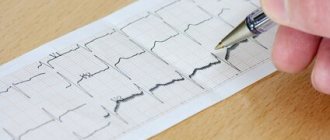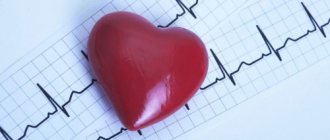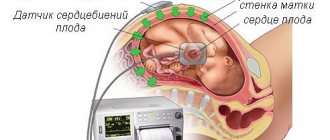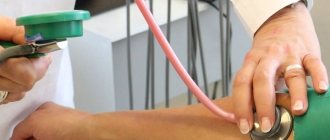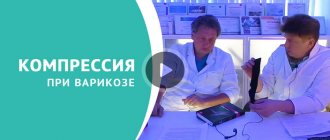Palpitations - a feeling that the heart is beating too quickly or is beating too hard - is a reason to consult a doctor.
Heartbeat
is a patient complaint about the subjective sensation of a rapid, arrhythmic or heavy heartbeat. Normally, we do not notice our heartbeat. But any deviation from the norm becomes immediately noticeable. Patients typically describe palpitations as the following: the heart pounding too hard (or “loudly”) in the chest, the heart “jumping” out of the chest, pounding, “jerking,” “spinning,” or “fluttering.” Increased heartbeat may be accompanied by a feeling of pulsation in the neck, temples, pit of the stomach or fingertips. Palpitations may also be accompanied by tinnitus, pain in the heart area, a feeling of tightness in the chest or difficulty breathing. Such symptoms may indicate heart pathology, but in most cases, complaints of increased heartbeat with accompanying symptoms, instrumental studies do not reveal signs of heart damage.
Palpitations should be distinguished from tachycardia. Tachycardia
– this is an objective increase in heart rate. The normal heart rate for an adult at rest is 60-80 beats per minute. If more than 90 beats per minute are recorded, then tachycardia is diagnosed. However, the patient may not feel that his heartbeat is rapid.
Common causes of heart palpitations
Even a healthy person can feel increased heartbeat. This is most common for people with increased nervous sensitivity. The following can lead to heart palpitations:
- significant physical effort;
- rapid rise to altitude;
- physical activity in a hot and stuffy environment (lack of oxygen leads to increased heart function);
- sharp mental stress (fear, excitement, etc.);
- consuming large amounts of foods high in caffeine (coffee, tea, Coca-Cola);
- certain medications (in particular, cold remedies);
- digestive disorders (for example, flatulence, as a result of which the diaphragm appears slightly elevated).
Palpitations may be felt when the temperature is high (patients with a fever often feel palpitations).
Microelements for the heart with tachycardia
Vitamins and minerals have a strong impact on the functioning of the cardiovascular system. Micronutrient deficiency very often causes tachycardia and arrhythmia. Therefore, to prevent the development of such a situation, drugs for tachycardia are used in the form of vitamin and mineral complexes. Minerals are responsible for the functioning of the heart and blood vessels:
- magnesium, which prevent blood clots by normalizing metabolic processes and controlling blood viscosity;
- calcium, which normalizes myocardial contractile function;
- phosphorus – a conductor of nerve impulses;
- selenium, which increases local immunity, providing protection to heart cells and blood vessels;
- potassium that accompanies the generated electrical impulse through the myocardial conduction system.
Increased heart rate and high blood pressure
Increased heart rate is often accompanied by increased blood pressure. In this case, the more often the heart contracts, the higher the pressure in the arteries. The dependence here is exactly that... Therefore, it is wrong to consider high blood pressure as the cause of increased heart rate. Another thing is that increased blood pressure, accompanied by a general deterioration in well-being, can make you notice how hard your heart is beating.
Rapid heartbeat and increased blood pressure can be caused by the same reasons. In this case, therapeutic measures aimed at normalizing blood pressure will also help normalize the heartbeat.
Review of drugs for tachycardia
Medications are prescribed to normalize the pulse and control heart contractions. When choosing the most effective remedy, the doctor takes into account the degree of progression of the disease, the presence of other pathologies and contraindications. Therapy is carried out under outpatient supervision of a specialist.
When the heart rate increases, it is necessary to take suitable antiarrhythmic drugs, which are divided into several groups. Drug therapy is prescribed individually for each patient.
Membrane stabilizing
The body’s reaction to membrane-stabilizing drugs is that the heart begins to beat more slowly. This is due to a disruption in the transport of potassium, sodium and calcium ions, which is achieved under the influence of the active components included in the preparations. In this case, there is a decrease in excitability and a weakening of contractions.
Among the most effective remedies for high pulse membrane-stabilizing action are:
- " Metostabil " (oral pulse tablets) - the dosage is gradually increased from 125-250 mg until a therapeutic effect is obtained. It is not recommended to take during pregnancy, lactation, or with liver and kidney failure.
- “ Etatsizin ” - you need to take tablets for tachycardia 50 mg three times a day. If the expected result is not achieved, the dosage is increased. You can take no more than 300 mg per day, divided into 3 doses. The drug is not recommended for myocardial hypertrophy, in the post-infarction state and for children under 18 years of age.
- “ Novocainamide ” - drink 0.25-1.00 g every 3-6 hours. If there is no result, the dosage is increased to 3 mg per day. Contraindications include heart failure, myocardial infarction and renal failure.
Beta blockers
Medicines developed on the basis of substances that block adrenergic receptors. Such drugs are used for hypertension because they affect the functioning of the nervous system. Beta blockers relieve pain in the heart and protect against atherosclerosis.
The action of the drugs is aimed at reducing the myocardial oxygen demand to reduce heart rate and support coronary blood flow. The active substances included in the composition prevent the formation of blood clots and the progression of the pathological process. The use of beta blockers reduces the incidence of heart attacks and reduces the likelihood of sudden death.
Cardiac glycosides (CG) to reduce heart rate
The pharmacological effect of cardiac glycosides is to change the basic functions of the heart. Under their influence, heart contractions increase, which leads to an increase in the volume of blood thrown into the aorta. The heart rate slows down, which increases blood flow to the heart ventricles.
The effect that SGs have on blood pressure is variable. With normal blood pressure levels, no changes are observed with the use of cardiac glycosides. The drugs have a pronounced calming effect on the central nervous system (CNS).
Cardiac glycosides that are prescribed for tachycardia:
- Sinus bradycardia in children: root causes of development, ECG signs, treatment
- "Digoxin";
- "Strophanthin";
- "Korglikon".
Increased heart rate and low blood pressure
An increased heart rate is quite possible even with low blood pressure. A sharp decrease in blood pressure can be observed during shock conditions (anaphylactic, traumatic, infectious-toxic, psychogenic and other types of shock). The body responds by speeding up the contraction of the heart muscle to restore blood pressure. A similar compensatory nature of increased heartbeat also occurs with large blood loss.
Prevention of tachycardia
Since tachycardia itself is not a disease, there is no specific prevention for this condition. Primary preventive measures consist of maintaining a healthy lifestyle, daily routine and proper rest - that is, the same as for the prevention of any heart failure.
Secondary preventive measures that should be followed in case of already established heart pathology imply more serious lifestyle adjustments, drug therapy prescribed by a doctor (if necessary, surgical interventions), as well as regular medical examinations.
Rapid heartbeat with normal blood pressure
However, increased heartbeat can be felt regardless of blood pressure. The pressure may be low or normal, but the patient complains of palpitations. This is possible with vegetative-vascular dystonia, anemia, thyroid diseases and a number of other diseases. You should not try to determine what you are sick with, much less begin treatment only on the basis of comparing your heartbeat and blood pressure. In all cases when you are concerned about increased heart rate, you must undergo an examination as prescribed by your doctor.
List of medications prescribed for heart rhythm disorders
The heart rhythm is controlled by special electrical currents that follow a given path. With arrhythmia, electric currents stray from the established route. Instead, electrical signals travel chaotically through the atria. This is what makes the heart beat chaotically. Drugs that are prescribed to treat problems with heart rhythm belong to the group of antiarrhythmics.
2 main types of drugs are used for heart rhythm disturbances
There are two main types.
Sodium channel blockers
Drugs of this subtype directly control heart rhythm. Mechanism of drug influence: active substances regulate the rhythm of contractions and the speed at which the heart muscle conducts electrical impulses. The active ingredients are focused on regulating electrical activity in the sodium channels of heart cells.
Trade names of such medicines:
- disopyramide (rhythmodan);
- mexiletine (mexarhythm);
- quinidine;
- procainamide (novocainomide);
- propafenone;
- flecainide.
Potassium channel blockers
Like sodium channel blockers, potassium channel blockers also help control heart rate. These are drugs that reduce the electrical conductivity of the heart by interfering with potassium channels.
List of such medicines:
- amiodarone (cordarone);
- dronedarone (multac);
- sotalol sandoz.
It is worth noting that dronedarone (multac) is an innovative drug that is used only to prevent arrhythmia in people who have already had a similar diagnosis in the past. It is not recommended to use this drug for prophylaxis. But sotalol Sandoz tablets, which reduce heart rate, combine the functions of a beta blocker and a potassium channel blocker.
When is palpitations a reason to see a doctor?
A rapid heartbeat is a reason to see a doctor if it:
- too intense;
- is protracted (does not go away for a long time);
- occurs with less and less exposure to the above factors;
- occurs independently of the above factors;
- is uneven in nature (arrhythmia can be assumed - a violation of the heart rhythm).
In these cases, rapid heartbeat may be a manifestation of serious disorders and diseases, such as:
- avitaminosis;
- anemia (low hemoglobin and iron in the blood);
- tetany (a condition caused by a lack of calcium);
- endocrine diseases;
- heart pathologies.
However, as a rule, in the case of myocarditis, other heart diseases, and hyperthyroidism, palpitations are not the main complaint. With such diseases, first of all, they complain of pain in the heart and shortness of breath.
It is necessary to react promptly if, against the background of increased heartbeat, dizziness, shortness of breath, pale skin, and sweating are observed. In this case, you should call an ambulance.
Blood thinners
Antithrombotic drugs are used for various cardiac diseases to prevent blood clots, heart attack or stroke.
For palpitations, they are prescribed if atrial fibrillation (atrial fibrillation) is diagnosed. In this case, chaotic contractions of the atria create conditions for the “churning” of blood clots inside them, which can enter the arterial bed and clog a large vessel feeding an organ. Antithrombotic drugs do not have the property of slowing heart rate.
For atrial fibrillation, the following medications are prescribed to prevent severe complications:
- warfarin;
- a combination of acetylsalicylic acid and clopidogrel (in extremely rare cases, if it is impossible to use other means);
- dabigatran etexilate (Pradaxa);
- apixaban (Eliquis);
- rivaroxaban (Xarelto).
These medications are not prescribed to all patients. There are strict conditions for their use, so independent use of such drugs is unacceptable.
We recommend reading about arrhythmia and bradycardia at the same time. You will learn about the types and causes of arrhythmia against the background of bradycardia, signs of arrhythmia and bradycardia, as well as treatment for bradycardia with arrhythmia.
And here is more information about Anaprilin for arrhythmia.
Anti-palpitation pills are selected by a cardiologist individually for each patient. Despite the variety of relevant medications, a limited number of medications are used to treat each type of arrhythmia. Treatment for palpitations should be carried out under the control of daily ECG monitoring, and self-administration of such drugs is unacceptable.
How can a doctor help with a strong heartbeat?
If you have a complaint about palpitations, you should contact a general practitioner or cardiologist.
When a patient complains of increased heartbeat, it is first necessary to establish its cause - whether it is of physiological or pathological origin. For this purpose, laboratory and instrumental studies may be prescribed, including ECG, echocardiography (ultrasound of the heart), and radiography of the heart. After identifying the cause of the increased heart rate, a course of treatment is prescribed aimed at eliminating pathological factors. Normalization of the heartbeat is achieved through treatment with antiarrhythmic drugs. Such drugs should not be taken on your own; they should be prescribed by a doctor in accordance with the condition of your body, established on the basis of a medical examination. Otherwise, the treatment result may be negative.
Emergency care for tachycardia
At home, if tachycardia occurs, the following measures are taken:
- you need to take a horizontal position,
- you can drink a sedative of herbal origin,
- If the patient has previously had an attack of tachycardia, the cause is known and the patient has recommendations for treatment, then you can take the medicine that was prescribed by the doctor to stop the tachycardia.
If the measures taken do not lead to restoration of the heart rhythm, then it is necessary to call an ambulance.
Diagnosis and treatment of tachycardia
You are experiencing palpitations, what to do in this situation? The answer is simple - contact a cardiologist. First of all, the doctor will conduct an accurate diagnosis. It begins with a detailed interview with the patient. It is important for the doctor to hear about all existing complaints, as well as about chronic diseases, heredity, etc. The main method of examination is an ECG. Currently, there is modern equipment for obtaining ECG data. With its help, any cardiac arrhythmia is determined as accurately as possible. Correct ECG analysis is of particular importance, so an experienced cardiologist interprets the data obtained. In some cases, to clarify the diagnosis, other methods of examining the patient are required: echocardiogram, Holter ECG monitoring, etc. We must not forget about additional research methods: blood tests, ultrasound of the thyroid gland, etc.
At the EXPERT Clinic, the entire necessary range of diagnostic measures is possible. There is modern ECG equipment, so the cardiologist will always make a quick and accurate diagnosis.
Rhythm under control
The doctor selects an antiarrhythmic treatment strategy. The main option for normalizing cardiac arrhythmias are antiarrhythmic drugs. Drug therapy is prescribed on a strictly individual basis. It depends on the form of tachycardia, existing chronic diseases and disorders, as well as on the causes that caused this condition! There are different groups of antiarrhythmic drugs depending on the main mechanism of action. Due to individual characteristics in the prescription of therapy, it is strictly forbidden to self-medicate. In difficult cases, urgent medical intervention is necessary to stop the attack.
Additionally, the cardiologist evaluates risk factors that may worsen the patient's condition. This may be family history, old age, arterial hypertension, some chronic diseases, lifestyle, etc. Simple rules for an adequate work and rest regime have a positive effect. This includes proper and restful sleep, good nutrition, limiting stressful situations, and the right approach to physical activity. If you have tachycardia, you should not smoke or drink alcohol. Alcohol and nicotine can independently affect the heart rhythm, and also become provocateurs of more serious pathologies. If palpitations occur, it is very important to always follow all doctor’s orders and regularly come for routine examinations. The specialist will evaluate the effectiveness of the prescribed therapy and clarify your well-being. Do not stop prescribed medications yourself. Only a cardiologist will help you choose the right tactics and take control of your heart rhythm.
The cardiologist at the EXPERT Clinic prescribes individual drug therapy only after a thorough assessment of the patient’s condition. A careful comprehensive approach and correct diagnosis guarantee effective treatment! Frequent heartbeat will no longer bother you.
Symptoms
Typically, patients who suffer from tachycardia due to hypotension complain that they hear the beat of their heart and can independently count the number of its contractions. They feel chest pain and heaviness in the stomach area, its normal functioning is disrupted. A person suffers from frequent headaches, and dizziness is a common complaint. An increased pulse with low blood pressure is manifested by an unreasonable feeling of anxiety.
Signs of low blood pressure also include:
- drowsiness,
- general weakness and bad mood,
- trembling in the body,
- increased sweating.
With a pronounced decrease in blood pressure, the blood supply to the heart and brain is disrupted. Patients experience nausea, darkening of the eyes and loss of consciousness.
How to choose a cardiologist
If you want to go to a medical institution for consultation because of rapid heartbeat, then first of all it is important to choose a clinic that has proven itself well. Advantages of the EXPERT Clinic:
- multidisciplinary medical center, which allows you to get advice from various specialists if necessary
- experienced and attentive cardiologists
- modern examination equipment, as well as practicing specialists in ultrasound and functional diagnostics
- the ability to quickly take all tests and provide examination results
- the most attentive attitude towards patients, only an individual approach, a detailed study of the problem
- convenience and comfort in the clinic, responsive medical staff.
Do not delay visiting a cardiologist, because timely identification of the main problem of “rapid heartbeat” can sometimes save your life.
How to notice the first signs of abnormal heart function
At first glance, it seems that it is impossible not to notice the development of cardiac pathology. But in reality, arrhythmia is often asymptomatic. The person continues to feel healthy, and if occasional attacks occur, he attributes them to overwork.
The pathological condition is accompanied by the following manifestations:
- changes in heart rate for no particular reason;
- chest tightness, pain;
- nausea, dizziness;
- loss of consciousness.
People experience these symptoms differently. For some, this is a reason to stay in bed, while others do not pay attention to poor health and risk their lives.
The presence of arrhythmia is easily confirmed by hardware diagnostics. If a doctor suspects a patient has this disease, he may prescribe a chest ultrasound, echocardiography, or electrocardiography.
Arrhythmia comes in different types. Modern medicine knows the following subtypes:
- atrial fibrillation (heart contractions are chaotic);
- paroxysmal tachycardia (pulse is regular, but very frequent - up to 240 beats/min);
- blockade (the pulse temporarily or completely disappears);
- extrasystole (out of sequence of contractions, which leads to an increase or fading of the rhythm);
- respiratory arrhythmia (blood pulses alternate incorrectly, this happens in adolescents or even children).
The most dangerous condition is considered to be erratic heartbeats. They are often accompanied by hoarse breathing, convulsions, and loss of consciousness.

